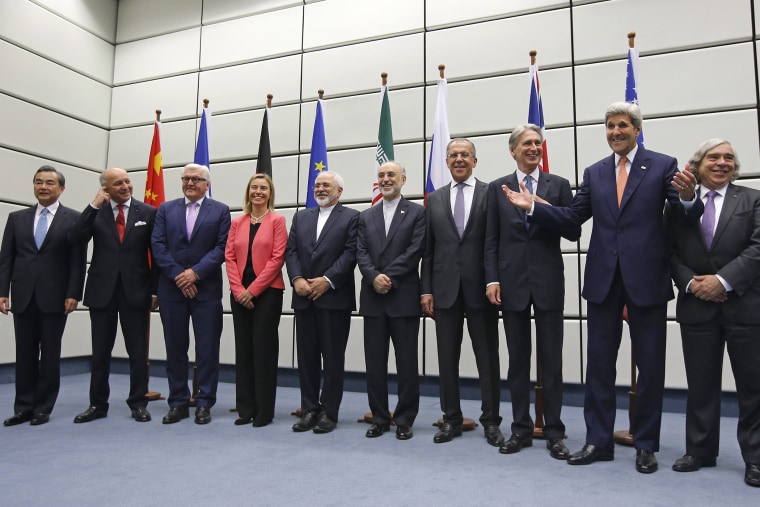If congressional Republicans have any chance at all of derailing the international nuclear agreement with Iran, they're going to need quite a few Democrats -- or more specifically, red-state Democrats who are most inclined to break party ranks.
That strategy is already unraveling. This week, Sen. Joe Donnelly (D) of Indiana, one of Congress' most conservative Democrats, announced his support for the diplomatic solution. This morning, Sen. Claire McCaskill (D) of Missouri, widely seen as an on-the-fence member, also backed the deal. The Kansas City Star published the senator's endorsement.
"I've spent weeks digging into the details of this agreement. And I've had extensive conversations with both those countries who are part of the negotiated agreement, and those countries currently holding Iran's sanctioned money. "It is clear to me that there is no certainty that Iran's resources will be withheld from them if America rejects the agreement. Instead, I believe it likely that the sanctions regime would fray and nothing would be worse than Iran getting an influx of resources without any agreement in place to limit their ability to get a nuclear weapon."
McCaskill is convinced that it is "more dangerous to Israel, America and our allies to walk away in the face of unified world-wide support" for the agreement.
At this point, the arithmetic is hard to ignore. As we've discussed, congressional Republicans, no matter how intense their zeal, cannot kill the policy on their own. GOP lawmakers will need no less than 44 House Democrats and 13 Senate Democrats to partner with far-right members to crush the international agreement.
As of now, the grand total of Senate Dems opposed to the deal is two, while in the House, there are 12 Democrats siding with Republicans.
Are there enough undecided Democrats remaining to possibly tilt the scales in the right's favor? Not really.
Remember, the script tells us how to expect the drama to unfold: the Republican-led House and Senate will pass a bill to kill the deal, which will naturally draw President Obama's veto. At that point, the GOP will have an greater challenge -- they don't need 44 House Dems and 13 Senate Dems to pass the bill, they'll need those Dems to override a veto.
But as things stand, the script may need a re-write -- there may not even be 60 votes to get the bill through the Senate in the first place.
As for the House, Minority Leader Nancy Pelosi (D-Calif.) said yesterday that Republicans simply will not find the Democratic votes in the chamber necessary for an override. And given that Pelosi is about the best vote-counter I've ever seen, I'm inclined to take her word for it.
Opponents of the diplomatic solution will need both chambers. Right now, they appear to have neither.
Senate Majority Leader Mitch McConnell (R-Ky.), reading the writing on the wall, conceded this week that the White House has "a great likelihood of success" in the upcoming showdown. Republican presidential hopeful Carly Fiorina added, "I earnestly hope that Congress will vote down this deal. But we should be realistic. The rest of the world has moved on."
GOP officials won't want to hear this, but I still think there's a smart play available to them. I'm reminded of what Matt Dowd, a former top strategist for President George W. Bush, told the Washington Post's Greg Sargent a month ago.
"If I were advising a presidential candidate, I'd tell him to argue that now that we have an agreement in place, it's better to elect the person who'd be toughest on Iran," Dowd said. "A Republican is going to be much tougher on Iran than Hillary or any other Democrat would be."
That's a far smarter posture than a pointless debate about killing an international agreement or promising to betray our allies on the first day of a new Republican presidency.
As we talked about at the time, this would require a reflex adjustment -- in debates like these, Republicans instinctively think, "Destroy," not "Govern." But Dowd's point is nevertheless sound. Effective implementation of the international agreement will require the United States to be vigilant and assiduous. There's ample room for a grown-up GOP candidate to tell voters that he or she, more than the other candidates, is best suited to follow through and make the deal work.
Any Republican takers out there willing to give this a shot?
